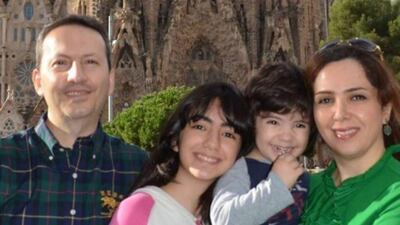The UN raised the alarm about the critical health condition of Iranian-Swedish academic Ahmadreza Djalali, who is reportedly close to death after months of prolonged solitary confinement in an Iranian cell.
Javaid Rehman, Agnes Callamard and other UN human rights experts in a statement lamented Mr Djalali’s “truly horrific” conditions in prison, where he is in a cramped cell and kept awake by bright lights around the clock.
“He has been held in prolonged solitary confinement for over 100 days with the constant risk of his imminent execution laying over his head,” the experts said on Thursday.
“Medical issues have prevented him from eating properly, resulting in dramatic weight loss. His situation is so difficult that he reportedly has trouble speaking. We are shocked and distressed by the cruel mistreatment of Mr Djalali.”
Iran's mission to the UN did not immediately answer The National's request for comment.
Mr Djalali, 50, formerly based in the Swedish capital Stockholm where he worked at the Karolinska medical institute, was arrested during a visit to Iran in April 2016.
He was sentenced to death 18 months later after being found guilty of passing information about two Iranian nuclear scientists to Israel's Mossad intelligence agency that led to their assassinations.
Mr Djalali, an expert in disaster medicine, says he is being punished for refusing to spy for Iran while working in Europe. He was granted Swedish citizenship in February 2018 while in prison.
Rights activists accused Tehran of jailing several dual citizens in an attempt to win concessions from other countries. Iran repeatedly rejects the claims and says its courts are fair.
"There is only one word to describe the severe physical and psychological ill-treatment of Djalali, and that is torture," the UN experts said.
“We denounce the actions of the Iranian authorities in the strongest terms, as well as their complete inaction despite our constant calls for him to be immediately released. The allegations against him are completely baseless and he should be allowed to return to his family in Sweden as soon as possible.”


